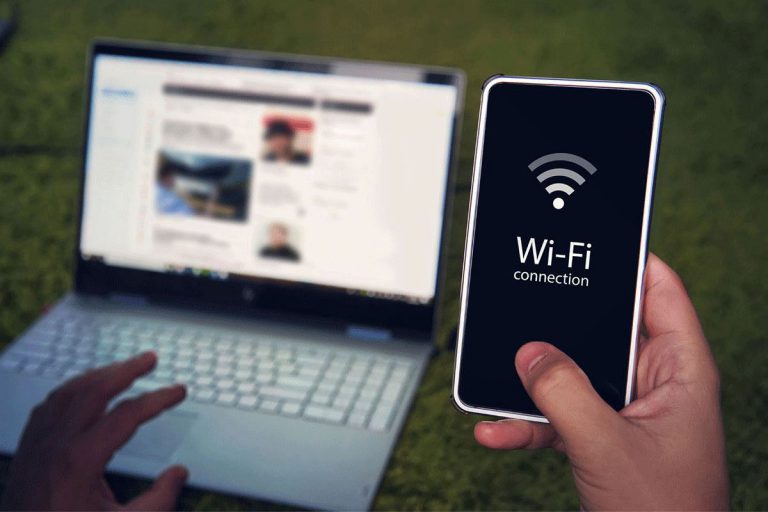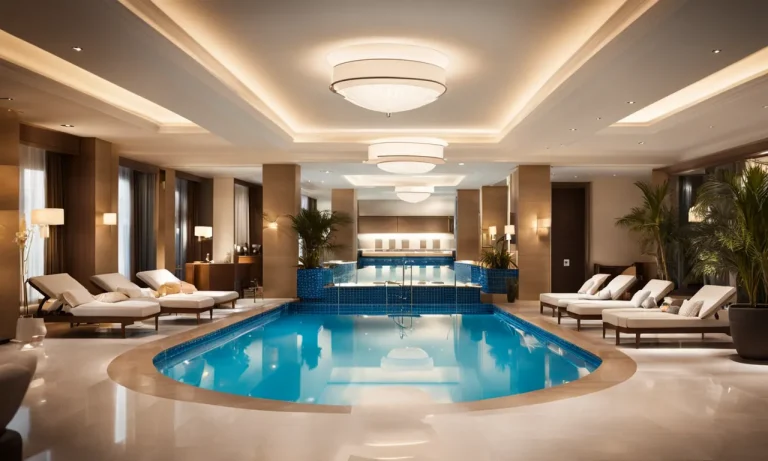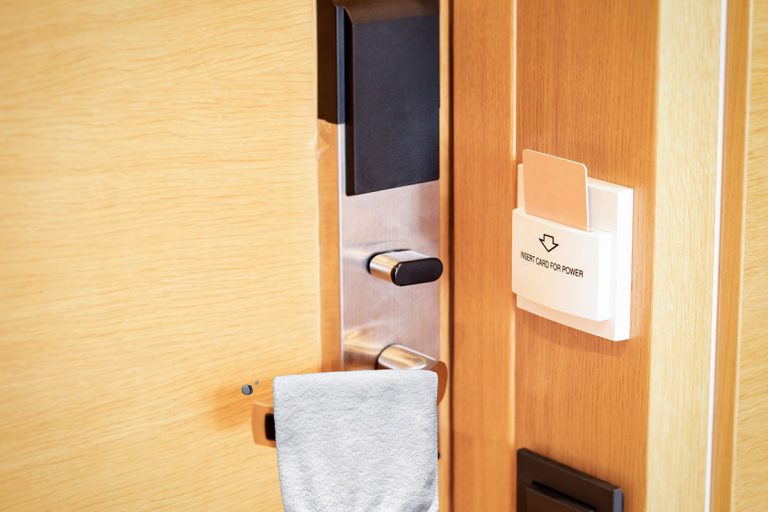Getting sick with COVID-19 while traveling and staying in a hotel can be stressful and uncertain. What should you do if you develop symptoms or test positive for COVID-19? Hotels have policies and procedures to accommodate and support guests in isolation.
This article will cover best practices if you contract COVID as a hotel guest. We’ll look at protocols for notifying the hotel, relocating to a quarantine room, delivering meals, extending your stay, sanitization procedures, and arranging medical care or transportation.
Informing Hotel Staff of COVID-19 Illness
Notify the Front Desk Immediately
If you suspect that you may have been exposed to COVID-19 or are experiencing symptoms, it is crucial to notify the hotel front desk immediately. They are trained to handle such situations and will guide you on the necessary steps.
The sooner you inform them, the faster they can implement the necessary precautions to ensure the safety and well-being of all guests and staff.
Provide Details of Symptoms and Test Results
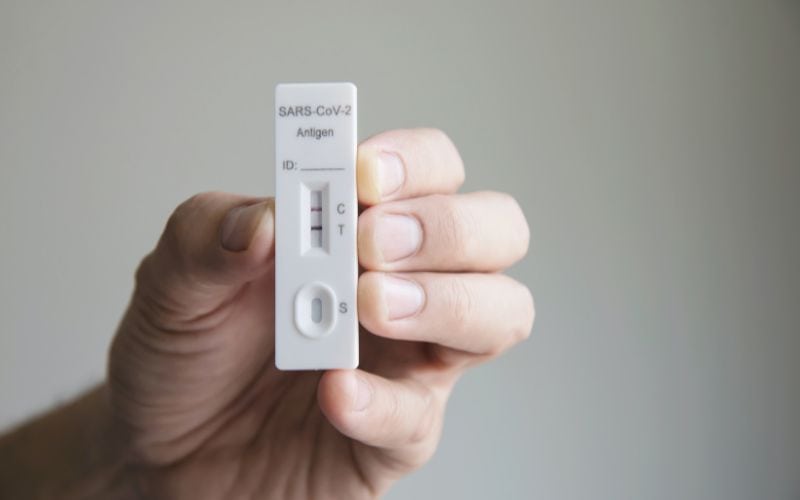
When informing the hotel staff about your COVID-19 illness, it is important to provide them with as much information as possible. This includes detailing your symptoms, such as fever, cough, or difficulty breathing, and any test results you may have.
This information will help the hotel staff assess the situation and take appropriate measures to prevent the spread of the virus.
Answer Questions for Contact Tracing
Hotel staff may ask you a series of questions for contact tracing purposes. Contact tracing is a crucial part of controlling the spread of COVID-19. By providing accurate information about your recent activities and interactions, you can help identify potential exposure risks and protect others.
Be honest and cooperative when answering these questions, as it will greatly assist in efforts to keep everyone safe.
For more information on COVID-19 and the necessary precautions, you can visit reputable sources such as the Centers for Disease Control and Prevention (CDC) or the World Health Organization (WHO).
These websites provide up-to-date information and guidelines to help protect yourself and others during this pandemic.
Relocating to an Isolation Room
When handling COVID-19 infection or exposure in a hotel, one of the most important steps is relocating to an isolation room. This ensures the safety of the infected guest and other guests staying at the hotel.
Isolation rooms are designed to minimize the risk of spreading the virus and provide a comfortable space for guests to recover.
Separate Quarantine Rooms or Floors
Hotels well-prepared for handling COVID-19 cases will have separate quarantine rooms or floors. These designated areas have proper ventilation systems and follow strict protocols to maintain cleanliness and prevent cross-contamination.
By isolating infected guests in these designated areas, hotels can effectively minimize the risk of the virus spreading to other guests and staff members.
Amenities Like Kitchenettes for Long Stays
For guests who need to stay in isolation for an extended period, hotels may provide amenities like kitchenettes. This allows guests to prepare their own meals and reduces the need for outside contact.
Access to a kitchenette can make a long stay in isolation more comfortable and convenient for guests, especially those who require special dietary needs or have specific food preferences.
Also Read: What is a Kitchenette in a Hotel?
Adjusting Reservation Dates
Hotels understand that unforeseen circumstances like COVID-19 infections or exposure can disrupt travel plans. Many hotels have implemented flexible reservation policies to accommodate guests who need to isolate or reschedule their stay.
This includes allowing guests to adjust their reservation dates without penalties or offering refunds for canceled bookings. Guests need to communicate with the hotel staff regarding their situation so that appropriate arrangements can be made.
For more information on hotel protocols and guidelines during the COVID-19 pandemic, you can visit the CDC website. They provide valuable resources and recommendations to ensure guests’ and hotel staff’s safety and well-being.
Having Meals Delivered During Isolation
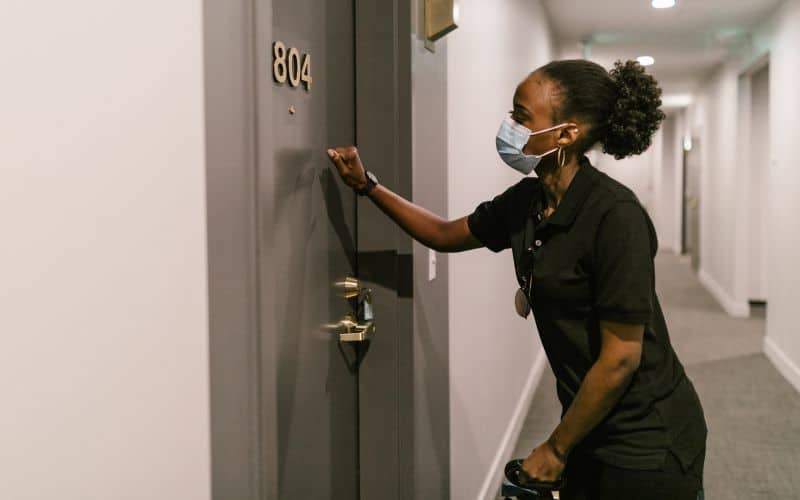
When you find yourself in a situation where you need to isolate in your hotel room due to a COVID-19 infection or exposure, it’s important to have a plan for getting your meals delivered safely.
Here are some helpful tips to ensure you have access to food while maintaining a safe environment.
Room Service or Contactless Delivery
Many hotels offer room service as a convenient option for guests. During your isolation period, this service can be a great way to have your meals delivered directly to your room. Make sure to inform the hotel staff about your situation so they can take the necessary precautions to ensure contactless delivery.
This may include leaving the food outside your door or using a designated delivery area.
If your hotel does not offer room service, you can explore other contactless delivery options, such as food delivery apps or local restaurants that offer delivery services. These platforms often have options for contactless delivery, allowing you to receive your meals without direct contact with the delivery person.
Informing Staff of Dietary Needs
It’s important to communicate any dietary needs or restrictions you may have to the hotel staff when ordering meals. This will help ensure that your meals are prepared according to your requirements.
Whether you have allergies, follow a specific diet, or have any other dietary concerns, informing the staff will allow them to accommodate your needs and provide suitable meal options.
If you have specific dietary concerns, providing detailed instructions or even speaking directly with the hotel chef or kitchen staff may be helpful. This will help minimize risks and ensure that your meals are safe and suitable for your needs.
Beverages and Snacks Stocked
During your isolation period, having a selection of beverages and snacks stocked in your room is a good idea. This will help you stay hydrated and satisfied between meals. You can request the hotel provide you with a mini-fridge or a minibar stocked with various options.
If the hotel does not provide these amenities, consider bringing your own non-perishable snacks and beverages. This way, you’ll have easy access to refreshments whenever you need them. Remember to choose items that are easy to store and require minimal preparation.
By following these guidelines, you can ensure that you have a safe and convenient way to have your meals delivered during your isolation period in a hotel. Remember to stay in touch with the hotel staff and communicate your needs effectively to make your stay as comfortable as possible.
Also Read:
Unlocking Hotel Minibar Secrets: How Usage is Tracked
How Do Hotel Minibars Work?
Hotel Precautions to Prevent Spread
Enhanced Sanitization Procedures
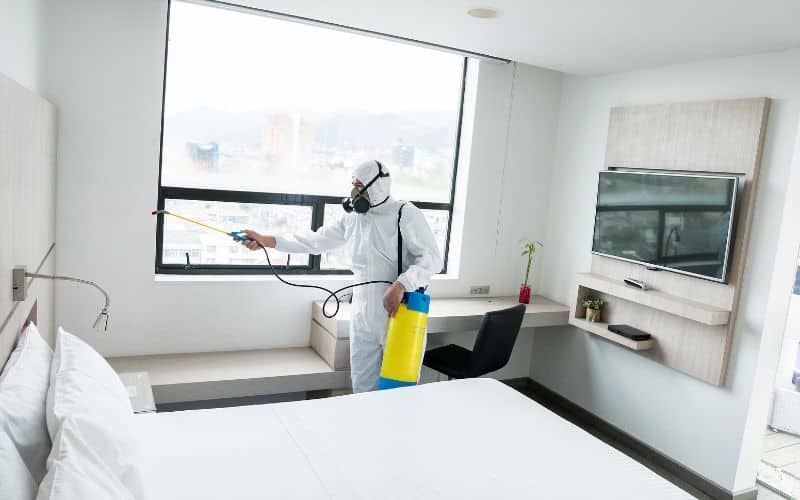
Hotels have implemented enhanced sanitization procedures to ensure the safety of their guests. Cleaning protocols have been intensified, with particular attention given to high-touch areas such as doorknobs, elevator buttons, and common areas.
Many hotels use hospital-grade disinfectants and follow guidelines set by health authorities to ensure thorough cleaning.
According to a study conducted by CDC, regular disinfection of frequently touched surfaces can significantly reduce the risk of COVID-19 transmission. Hotels take this recommendation seriously by implementing rigorous cleaning practices to create a safe environment for their guests.
Staff PPE and Limited Contact
Hotel staff are equipped with personal protective equipment (PPE) such as masks and gloves to minimize the risk of transmission. They have received training on proper hygiene practices and are following strict protocols to ensure the safety of both guests and themselves.
Many hotels have implemented contactless check-in and check-out procedures to limit contact and maintain social distancing. This allows guests to complete necessary procedures without coming into close contact with hotel staff.
Additionally, some hotels provide digital menus and room service options to minimize contact in dining areas.
By prioritizing the health and safety of guests and staff, hotels play a crucial role in preventing the spread of COVID-19 within their premises.
Extending Stay to Complete Quarantine
In cases where a guest has been exposed to COVID-19 or has tested positive, hotels are taking proactive measures to ensure proper quarantine procedures are followed. Some hotels are offering the option to extend the guest’s stay to complete the required quarantine period.
By providing a safe and comfortable space for guests to isolate, hotels are helping to prevent the spread of the virus to others. This is particularly important for individuals who may not have suitable accommodation or living conditions to quarantine safely.
Guests need to inform the hotel if they have been exposed or tested positive for COVID-19 to ensure appropriate measures can be taken to protect others.
Conclusion
If you get COVID-19 while staying in a hotel, follow protocols like isolation, contact tracing, and arranging meals to protect yourself and others.

